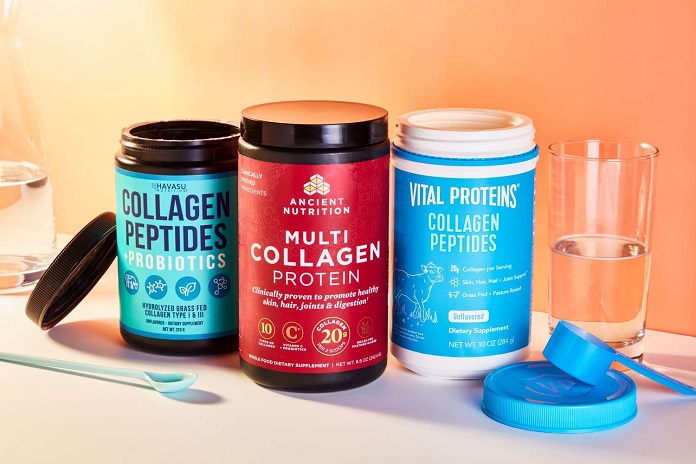I think everyone has heard about collagen supplements, however, collagen is a fundamental protein is the supplements that play a crucial role in maintaining the structural integrity of various tissues in the body. It’s the most abundant protein in the human body, making up about 30% of the total protein content. If you want to know more about what collagen is, its types, functions, and importance then this article is for you:
Table of Contents
ToggleWhat is Collagen?
Collagen is a structural protein that provides strength, elasticity, and support to tissues throughout the body. Likewise, it’s found in connective tissues such as skin, tendons, ligaments, cartilage, and bones. Similarly, Collagen fibers are made up of long chains of amino acids, which form a triple helix structure, giving collagen its strength and flexibility.
How Collagen Supplements Work
Collagen supplements, particularly hydrolyzed collagen (collagen peptides), work by providing the body with the building blocks needed to maintain and repair connective tissues. Here’s how they generally function:
- Digestive Absorption: Hydrolyzed collagen is broken down into smaller peptides during processing. This makes it easier for the body to digest and absorb through the gastrointestinal tract. Once absorbed, these peptides enter the bloodstream and travel to areas where collagen is needed.
- Stimulating Collagen Production: Collagen peptides stimulate the body’s collagen production by signalling cells called fibroblasts in the skin and connective tissues to produce more collagen. This can help support the skin’s elasticity, reduce wrinkles, and improve joint function.
- Providing Building Blocks: Collagen supplements provide essential amino acids (such as proline, glycine, and hydroxyproline) that are crucial for the synthesis of new collagen fibers and for maintaining the structural integrity of tissues.

Source: Nutrition News.Abbott
How to Choose the Right Collagen Supplement
Determine Your Health Goals:
- Skin Health: If your goal is improving skin elasticity and reducing wrinkles, look for collagen supplements that contain Type I collagen (often found in marine collagen and some multi-collagen blends).
- Joint Health: For joint health support, Type II collagen (found in chicken collagen) may be more effective. Some products also combine collagen with anti-inflammatory ingredients like curcumin for enhanced joint relief.
- Overall Wellness: A multi-collagen supplement can provide a broad range of benefits for skin, joints, and gut health.
Consider the Type of Collagen:
- Type I Collagen: Supports skin, hair, and nails. Often derived from bovine or marine sources.
- Type II Collagen: Supports joint and cartilage health. Typically mainly sourced from chicken.
- Type III Collagen: Often found alongside Type I, supporting skin and cardiovascular health.
Assess Bioavailability:
- Hydrolyzed Collagen: This is the most common and effective form due to its ease of absorption. It is processed into smaller peptides, making it more absorbed by the body.
- Gelatin: While it is a less processed form of collagen, it is not as easily absorbed as hydrolyzed collagen.
- Undenatured Collagen: Less processed and retains its natural structure, which may be beneficial for joint health.

Source: Cleveland Clin
Evaluate Additional Ingredients:
- Vitamin C: Essential for collagen synthesis. Many collagen supplements include vitamin C to enhance the body’s ability to produce collagen.
- Hyaluronic Acid: Supports skin hydration and elasticity. Found in some collagen supplements to improve skin moisture.
- Digestive Enzymes: Help with the breakdown and absorption of collagen, enhancing its effectiveness.
Check for Quality and Purity:
- Source: Supplements that use grass-fed, pasture-raised, or wild-caught sources to ensure higher quality and fewer contaminants.
- Third-Party Testing: Look for products that are tested by laboratories to verify their purity, potency, and safety.
Choose the Form That Fits Your Lifestyle:
- Powders: Versatile and can be mixed into various beverages. Often preferred for their flexibility.
- Capsules/Tablets: Convenient and easy to take but might be more expensive and less customizable in dosage.
- Liquids: May offer faster absorption but can be less convenient and more costly.
Types of Collagen
There are at least 16 types of collagen, but the most common ones are listed,
- Type I Collagen:
- Location: Found in skin, tendons, ligaments, bones, and corneas.
- Function: Provides tensile strength and durability. It’s the most prevalent type in the body and is essential for maintaining the integrity and elasticity of skin and connective tissues.
- Type II Collagen:
- Location: Predominantly found in cartilage.
- Function: Provides structural support to cartilage, helping with joint flexibility and shock absorption.
- Type III Collagen:
- Location: Found in skin, blood vessels, and internal organs.
- Function: Supports the elasticity and integrity of tissues, especially in areas that stretch and contract.
- Type IV Collagen:
- Location: Found in the basal lamina, a layer of the extracellular matrix that supports epithelial tissues.
- Function: Plays a role in filtering and maintaining the structure of tissues.
- Type V Collagen:
- Location: Found in the surfaces of cells, hair, and the placenta.
- Function: Helps in the formation of Type I collagen fibers and contributes to tissue structure.
Types of Collagen by Source
- Bovine Collagen: Sourced from cows, this type primarily contains Type I and III collagen, which are beneficial for skin, hair, nails, and overall body tissue health.
- Marine Collagen: Sourced from fish, this type mainly contains Type I collagen, which is highly effective for skin health. It is often preferred for its higher bioavailability.
- Chicken Collagen: This type contains Type II collagen, which is beneficial for joint health and cartilage.
- Eggshell Membrane Collagen: This form contains Type I, V, and X collagens, supporting skin health and joint function.

Source: https://longevity.technology/
Sources of Collagen
Here are the list of the sources of collagen,
- Bone Broth: Rich in collagen derived from simmered animal bones.
- Chicken Skin: Contains Type II collagen found in cartilage.
- Fish: Fish skin and bones are sources of Type I collagen.
- Gelatin: Derived from cooked collagen, found in many traditional dishes and desserts.
- Collagen Powders: Hydrolyzed collagen or collagen peptides are commonly used for easy absorption and digestion.
- Capsules/Tablets: Convenient forms of collagen supplements.
- Liquids: Some supplements come in liquid form for quick absorption.
Functions of Collagen
- Structural Support:
- Skin: Collagen provides elasticity and strength to the skin. It helps maintain the skin’s firmness and suppleness, reducing the appearance of wrinkles and sagging.
- Bones: Collagen contributes to bone strength and structure. It forms a framework that supports calcium and other minerals, giving bones their rigidity.
- Tendons and Ligaments: Collagen provides the tensile strength needed for tendons and ligaments to withstand stress and strain, ensuring joint stability and movement.
- Joint Health:
- Cartilage: Collagen is a major component of cartilage, which cushions joints and helps absorb shock during movement. Type II collagen, in particular, is crucial for maintaining cartilage integrity.
- Wound Healing:
- Repair: Collagen plays a vital role in wound healing by forming new tissue and providing a scaffold for new cells to grow. It helps close wounds and repair damaged tissues.
- Skin Hydration:
- Moisture Retention: Collagen helps retain moisture in the skin, which is essential for maintaining a healthy and youthful appearance.
- Blood Vessel Health:
- Support: Collagen contributes to the strength and elasticity of blood vessels, which helps maintain proper circulation and cardiovascular health.
Most Effective Collagen Supplement
The effectiveness of a collagen supplement can vary based on individual needs and the specific type of collagen being used. Here are some key points to consider:
- Bioavailability: Hydrolyzed collagen (collagen peptides) is generally considered more effective because it is broken down into smaller, more easily absorbed molecules. This makes it more likely to be utilized by the body compared to non-hydrolyzed forms.
- Type of Collagen: Different types of collagen support different health aspects. Type I and III are best for skin, hair, and nails, while Type II supports joint health. A multi-collagen blend (like that in Ancient Nutrition’s supplement) provides a broader range of benefits.
- Additional Ingredients: Supplements that include vitamin C (which is essential for collagen synthesis) and other supportive ingredients (like hyaluronic acid) may offer enhanced benefits. For example, Garden of Life Grass Fed Collagen Peptides and Reserveage Nutrition Collagen Replenish include added nutrients that support collagen production and skin hydration

Source: Houston Methodist
Benefits of Collagen Supplements
Collagen supplements are used to help counteract the decline in natural collagen production and support various aspects of health. Potential benefits include:
- Improved Skin Health: Supplements can enhance skin elasticity, reduce wrinkles, and increase moisture.
- Joint Support: Helps maintain cartilage health and reduce joint pain.
- Stronger Nails and Hair: Supports the strength and growth of nails and hair.
- Bone Health: This may help improve bone density and reduce the risk of fractures.
Collagen Production and Aging
As we grow older and older our body’s natural collagen production decreases. This reduction can lead to various signs of aging, like
- Wrinkles and Sagging Skin: Decreased collagen levels contribute to the loss of skin elasticity and firmness, leading to wrinkles and sagging.
- Joint Pain: Lower collagen levels in cartilage can result in joint discomfort and stiffness.
- Weaker Bones and Muscles: Reduced collagen can affect bone density and muscle mass, increasing the risk of fractures and falls.
Conclusion
The choice of the best collagen supplement will ultimately depend on your specific needs, preferences, and health goals. Vital Proteins Collagen Peptides and Ancient Nutrition Multi-Collagen Protein are top picks for their high-quality collagen and broad benefits.
Sports Research Collagen Peptides is ideal for those seeking a high dose of collagen and quality assurance. For added nutrients, Garden of Life Grass Fed Collagen Peptides and Reserveage Nutrition Collagen Replenish offer enhanced benefits.
Choosing the right collagen supplement involves assessing your health goals, the type and form of collagen, additional ingredients, and product quality.
FAQs
What are the benefits of taking collagen supplements?
Benefits include improved skin elasticity, joint support, stronger hair and nails, and better bone health.
Are there different forms of collagen supplements?
Yes, they come in powder, capsules, tablets, liquids, and gummies.
Are collagen supplements safe?
Yes, they are generally safe but consult a healthcare provider if you have allergies or health conditions.
How long does it take to see results from collagen supplements?
Results are often noticed within 4 to 6 weeks of consistent use.
Can collagen supplements interact with medications?
Collagen supplements typically do not interact with medications, but consult your doctor if in doubt.
How much collagen should I take daily?
Typical doses range from 2.5 to 15 grams per day; follow label instructions.
Are there any side effects of taking collagen supplements?
Mild digestive issues like bloating may occur; severe reactions should be reported to a healthcare provider.
Can collagen supplements replace a balanced diet?
No, they should complement a healthy diet, not replace it.
Are collagen supplements effective for everyone?
Effectiveness depends by individual consistent use and a healthy lifestyle can enhance benefits.
Also, read more about Top 10 Benefits of Collagen and it’s Side Effects
